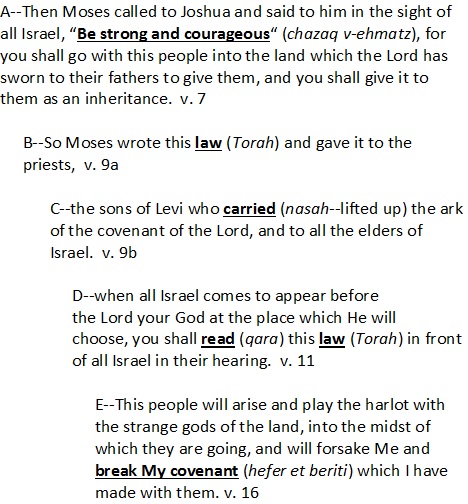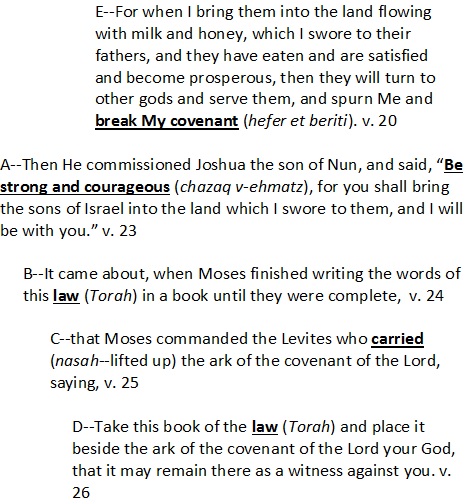CHIASM: DEUTERONOMY 31:7-26


Explaining the Chiasm
What attracted me to this chiasm was the repetition of phrases and words in letters A through D, first toward the beginning of the chapter initiated by Moses’ calling of Joshua, and then toward the end, initiated by Moses’ commissioning of Joshua as the prophet who would ultimately lead the people of Israel into the promised land. In both verses pertaining directly to Joshua, there is a repeating phrase, “Be strong and courageous (chazaq v-ehmatz).” Following that, there is a correspondence of references to the “law” (Torah) in verses 9b and 24. Then, the priests “carry” (nasah) the ark of the covenant in verses 9b and 25. This is followed by the reading of the Torah to all Israel in verse 11 so they might observe its teaching, contrasted with the Torah as a witness against a disobedient Israel in verse 26.
The trajectory of these parallel verses point to a repeated prophecy inside them in verses 16 and 20, whereby it is written that Israel would one day turn to other gods, forsake the God of Israel, and break their covenant with YHVH. We will come back to this later.
Embedded in these verses are two items that arrest our attention. The first is a parallelism represented by letter B, referring to the writing of the Torah by Moses. Over time, a competing theory among scholars emerged that the Torah was a compilation of multiple sources,[1] dating from the 5th to the 1st century B.C., hundreds of years after the life of Moses. I have observed both Jewish rabbis and Christian pastors who openly adhere to this line of thinking. I read something several years ago by the late Rabbi Yechiel Eckstein, founder and president of the International Fellowship of Christians and Jews. From memory alone, I recall that he said something to the effect that belief in the writing of the Torah by Moses was of paramount importance to our faith. Aside from that, we would be left with a Torah authored and compiled by men alone, absent the direct, divine dictation of God. Scripture, centered in Deuteronomy 31, specifically the parallelism found in verses nine and twenty-four, testifies to God’s hand in the creation of the Torah.[2]
I find yet a second item in these verses of special interest. In verse 11, once the Torah was written down by Moses, it was read “in front of all Israel in their hearing.” Looking back one verse, we find that the Torah was read “at the end of every seven years. . .at the Feast of Tabernacles (chag ha sukkot).” And continuing forward into verse 12, the purpose is revealed: “So that they may hear and learn and fear the LORD your God, and be careful to observe and do all the words of this Torah.” The Torah would be read just once every seven years. Bearing in mind that there were no copies of a book in those days, this is a remarkable gap between readings, especially with the expectation that the people of Israel would “hear” and “learn” so that they would thereby “observe all the words (kal dibre) of this Torah.” What this suggests is that God regards the Torah as so simple that a reading once every seven years was sufficient to learn it, observe it and do it.
This begs a question: why do people read from Scripture every Sunday, sometimes even daily, and conduct weekly Bible studies? The early Israelites, in comparison, had Scripture read to them once every seven years! Perhaps they were gifted with especially keen memories. One other thought is this: they listened to the words written down by Moses which, in turn–if you believe that God dictated His words to the prophet, and if you believe that Moses faithfully wrote them exactly as they were spoken, then the Israelites were only one step removed from speaking to the LORD Himself. We, on the other hand, rely on English translations of Hebrew manuscripts that were themselves copies of copies of copies. Moses’ hand wrote the LORD’s words. Today, multiple hands of men bear heavily on what we read, from ancient scribes to English translators. Of the over 50 English translations of the Torah, no two are translated the same. Translators insert their own interpretations of the text, even adding words to “make it easier” for their English readers to understand. Take, for instance, Psalm 135:13. The first line of this verse in Hebrew reads: “YHVH, shim-ka l-olam.” It reads, word for word, “LORD, Your Name to forever.” Several translations including the NIV, ESV, NLT and the venerable King James, insert the word endures. It would then read “LORD, Your Name endures forever.” Good English, perhaps even an interpretation we would agree with, but the word “endures” is not in the Hebrew text.
What can we say? The people of Israel in Moses’ time had a “less filtered,” perhaps even “unfiltered,” access to the words of Scripture. Today’s Bibles are “filtered” through many hands and minds–adding and subtracting words, choosing words that embed interpretations into the text. For this reason, we need a more intensive study of Scripture to wade through, if not beyond, our English translations in search of the actual meaning. A seven-year gap between studies would be way too long for us.
One additional point, and for that we return to the chiasm. The flow of the chiasm is very revealing. It begins with the exhortation of Moses to Joshua, “be strong and courageous.” From there it goes to the writing of the Torah by Moses, to the carrying of the Ark containing the tablets from Mt. Sinai upon which were inscribed the Ten Commandments, and then the reading of the Torah to all Israel. Finally, at the center of the chiasm, there is the prophecy regarding the falling away of Israel, serving other gods, breaking its covenant with God. The message speaking here is that the Torah that Moses committed to writing, the commandments “lifted up” by the Levites and the Word of God spoken to all Israel is for naught unless one is “strong and courageous” in reading, carrying and obeying those Words. It was prophesied Israel would not do this, despite the efforts of Moses and the simplicity of comprehending and carrying out the “less filtered” instructions of the Torah. Israel would still “break My covenant.” Our task, even today, is to remain “strong and courageous” to carry out God’s Word in our lives, striving first, with strength and courage, to identify and understand the actual, “unfiltered” words God has given to us.
[1] The most frequently cited sources are designated by the acronym, JEPD, in which the “J” stands for Jahwist (or Yahwist), the “E” for Elohist, the “P” for Priestly and the “D” for Deuteronomist.
[2] In Proverbs 8:22-23 we read: “The LORD possessed (qanah) me at the beginning of His way, before His works of old. From everlasting I was established, from the beginning, from the earliest times of the earth.” The word translated as “possessed” is qanah. It is the root of the name of Cain, meaning “acquire.” It is also used in the context of “origination” or “creation.” It is widely understood that Solomon was talking about Torah when he spoke of wisdom. Hence, Torah is described here as that which God created from “the beginning” (reishit), thereby asserting Torah as originating from God, not from the minds of men.

